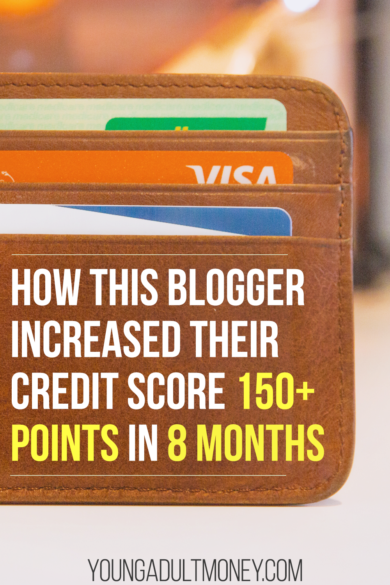 How good – or bad – your credit score is can have a big impact on your money.
How good – or bad – your credit score is can have a big impact on your money.
The most obvious impact it can have is on your ability to take out loans, but it goes beyond simply qualifying for one. The better your credit score, the better the rate you will get on your loans.
Let’s take private student loans as an example. One strategy that I recommend for people with private student loans is to regularly see what interest rates various companies will offer for refinancing. If you are able to refinance your private student loans at a lower rate, it makes sense because you will be paying less interest towards your student loans. You can do this over and over as your credit score improves and/or banks offer you better rates.
Your credit score can impact your ability to rent the apartment you want, qualify for a low interest rate on a mortgage, and more. It makes sense to continually work towards improving your credit score.
Today I want to share about a fellow blogger and friend who increased their credit score over 150 points in 8 months. This may sound like a big increase – and it is – but the actions he took are ones that anyone can take to improve their credit score. Let’s dive into his story.
How a Blogger Increased their Credit Score 150+ Points in 8 Months
 I’ve known Jason Butler, blogger at My Money Chronicles, for the better part of a decade. What I love about Jason is his focus on self-improvement and his hustle. I’ve never seen someone have so much success on an eBay side hustle, but it’s because of the consistent time and effort he puts into it.
I’ve known Jason Butler, blogger at My Money Chronicles, for the better part of a decade. What I love about Jason is his focus on self-improvement and his hustle. I’ve never seen someone have so much success on an eBay side hustle, but it’s because of the consistent time and effort he puts into it.
I recently listened to a podcast interview of Jason and he shared about how he quickly turned around his credit score and got his finances in shape. His credit score was in the mid 550s and he was able to increase it over 150 points in just 8 months.
For context here is a general breakdown of what your credit score means:
Less than 500: Very Bad
500-549: Bad
550-599: Poor
600-649: Fair
650-699: Good
700-749: Very Good
750 and up: Excellent
Jason was able to get his score from “poor” to “very good.” Once you are in the 700+ range, you open yourself up to better interest rate offers. This is the range you want to be in.
Contrary to popular belief your credit score has nothing to do with how much money you make or how much you have in savings. It has everything to do with how reliable you are as a borrower. In other words your score should help a lender answer the question of “how likely is it that this individual will make payments on time?”
What Jason did was simple. In his words, “I got current on every debt. I called my creditors and told that I was ready to work with them. I also made sure to pay every bill on time.”
Lenders do not want to write-off your debt. (They also don’t want you to entirely pay off your debt, but that’s for another post.) They don’t mind people having outstanding debt – and actually prefer it – as long as the borrower is making the required payments. Jason went from not making payments to getting his debt current and making payments.
If you look at what impacts your credit score, it’s no surprise that Jason was able to improve his credit score so much. Here’s a high-level breakdown of what impacts your score.
35% Payment History
30% Amount Owed
15% Length of Credit History
10% New Credit Applications
10% Types of Credit
Over 1/3 of your score is based on your payment history. If you stop making payments your score will go into a free-fall. Conversely, if you start making on-time payments your score will improve.
The amount owed aspect of your credit score is focused on how much of your available credit you are utilizing. Lenders like to see your credit utilization at 30% or less. For example let’s say across your credit cards you have $10,000 of available credit. Ideally you would keep the amount of credit used at $3,000 or less. If you can keep it even lower, that’s great, but you have to start somewhere. The more payments you make towards your credit card debt, the lower your utilization will be over time, which inevitably will improve your credit score.
Unsure of what your credit score is? You can get it for free within the dashboard of just about any credit card, or through Credit Sesame.
Practical Ways to Improve Your Credit Score
If you want to improve your credit score there are some practical steps you can take. The biggest reason people’s credit scores stay low is due to inaction. So take these steps to get your score moving in the right direction.
- Start Making Payments – If you’ve stopped making payments on your debt, it’s important to get in touch with your lenders and work out a plan to start making payments. This is exactly what Jason did to improve his score by more than 150 points, and it will set you on the same path.
For student loans specifically I put together a guide showing what to do if you are behind on your payments.
- Consider a Credit Builder Loan – One way people with no credit history or bad credit history have quickly improved their credit score is through a credit builder loan. I’ve worked with the company Self in the past and would recommend looking into their credit builder option. The loan is different than a traditional loan because you are actually paying yourself, and at the end of the term of the loan you actually have money saved up. They go out of their way to make sure that all three credit reporting bureaus are aware of your on-time payments, which in turn helps increase your credit score.
If you are struggling with how much debt you have, consider reading this post that has tips on how to approach it, or read my post about what to expect when working with a debt lawyer.


Thanks for featuring me!